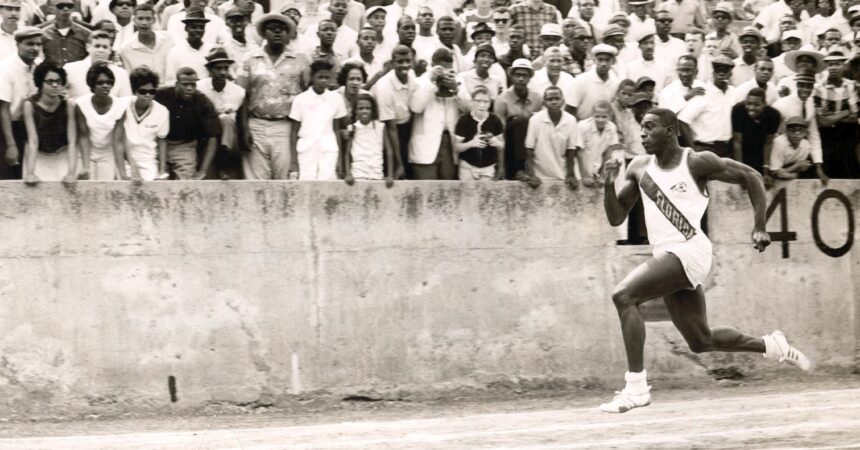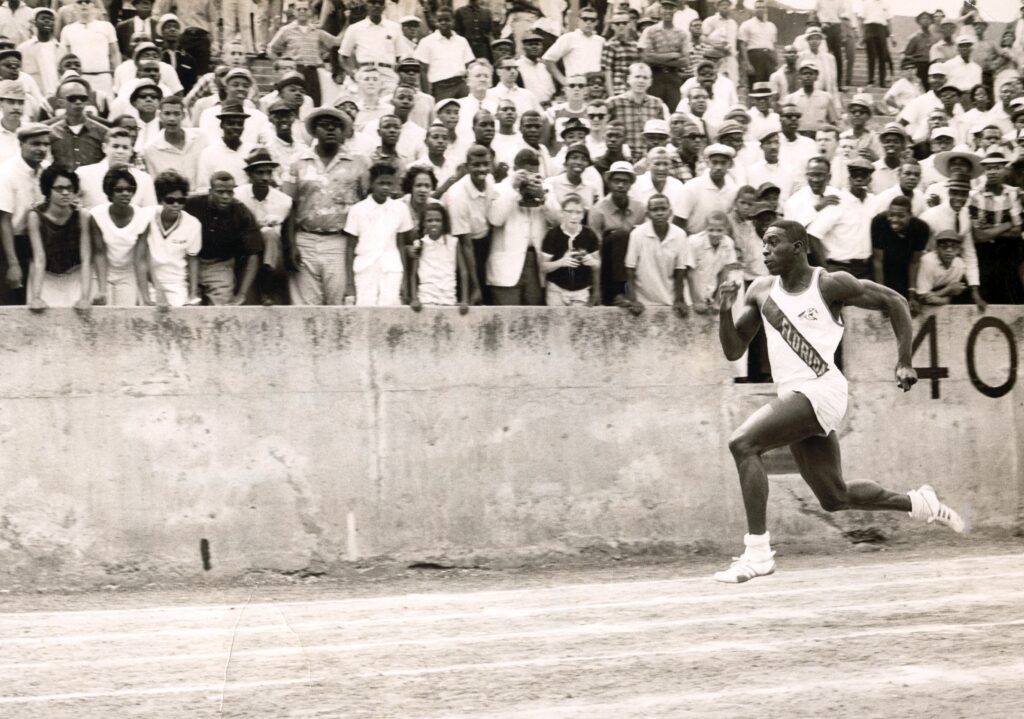
Hayes beats the odds
Olympics return to
Tokyo elicits memories of Bullet Bob’s exploits

Photo submitted
By Vaughn Wilson
Special to the Outlook
Florida A&M University alumnus Robert Lee “Bob” Hayes was the quintessential multi-sport athlete.
He remains the only person in history to win both an Olympic gold medal and an NFL Super Bowl ring. Fittingly, he was inducted to both halls of fame for his performance during his career.
Hayes is being remembered as the Olympics return to Tokyo this year, the first time since the former Rattler made his mark on the 1964 Games. Hayes died in 2002 at age 59.
Hayes was known by many names, most commonly as “Bullet” or “Bullet Bob.” However, to those who knew him during his college days at FAMU he was affectionately called “Crow.”
Some recalled that coach Pete Griffin gave Hayes the nickname “Crow,” because he was dark-skinned and his speed seemed to make him fly.
He was a once-in-a-lifetime athlete. The Jacksonville native, who had an amazing physique and an unrivaled will to win, was recruited by football coach Jake Gaither to play split end for the Rattlers.
Hayes never lost a 100-yard or 100-meter race his entire collegiate and Olympic career. He possessed the rare talent to alternate between track and football and excel in both at very high levels.
Gaither was partial to Hayes being his split end. The coach’s goal every year was to win a national championship, so he made every effort to keep Hayes in his pads.
Hayes would set records at track meets across the country, but they ruled unofficial because they were all in Black college meets. With the extensive cost of automated timing systems, the NCAA would not accept Hayes’ times from the meets he was dominating. With segregation in full effect, neither Florida State, where Hayes trained, nor the University of Florida, just two hours away, would invite him to compete in their meets.
In 1962, the University of Miami made one of the boldest moves at a predominantly White institution in the South by inviting Hayes to run in its meet. Hayes had one opportunity to prove his greatness. He didn’t disappoint. He tied the world record of Frank Budd of Villanova in winning the 100-yard dash in 9.2 seconds.
There was just one problem with Hayes’ victory in Miami…Gaither. Robert “China Doll” Paremore, Hayes’ relay teammate at FAMU, vividly remembered Gaither’s reaction when Hayes returned.
“He told Crow that he hadn’t sent him down there to tie a record; he sent him to break the record,” Paremore said.
It was the tough love Gaither used to motivate his players throughout his career. The record of success of Gaither’s athletes upon graduation is phenomenal. He was determined to develop well-rounded men through the game of football.
Hayes would get an invitation to the U.S. Olympic team in 1964 and would not accept the invitation immediately.
Gaither was concerned that the time away from the team would hurt the Rattlers’ run at a national championship, which he sought every year. Eventually, Gaither allowed Hayes to accept the invitation, but with a condition.
“You will have to earn your spot back when you finish with the Olympics. We don’t hold positions for anybody,” Gaither famously told Hayes.
Hayes made the most of his trip to Tokyo. Before he was to run in the 100-meter finals, an odd situation occurred. One of his spikes tore and he had to borrow a shoe from a teammate.
Running in mismatched shoes, Hayes won the 100-meter dash in record time. Unfortunately, without a history of internationally recognized time, Hayes was delegated to lane No.1. Anyone who knows about track understands that the first lane is the most unappealing lane to run in, but it didn’t matter to Hayes.
To end his Tokyo performance, two members of the U.S. 4x100m relay team went down with injury. With Hayes as anchor, the U.S. team was favored to win the race, but at that point it was doubtful if the U.S.A. could even field a team.
This is where the legend of “Bullet Bob” was built.
Hayes recruited two of the team’s 200-meter runners to run the relay. The skepticism in the track community grew to the point of taunting. Jocelyn Delecour, the anchor leg runner from France, famously told U.S.A. runner Paul Drayton before the relay final that, “You can’t win. All you have is Bob Hayes.”
Hayes had an American pride that ran deep in his blood.
“The Russians, and I’m not being conceited, but they can’t beat us. I told Paul Drayton to just give it to me close, we’ll win the race,” Hayes said.
Well, it didn’t go as planned as Team USA handed Hayes the baton in fifth place. One reporter described Hayes’ leg of the race as “an explosion down the track never seen before or since.”
Hayes blazed past all of those world-class runners, leaving five meters between himself and second place and tossing the baton in the air upon crossing the finish line. Hayes earned two Olympic gold medals.
Drayton sought out Delecour after the race and uttered, “That’s all we need.”
He even earned the respect of Gaither who accepted Hayes’ invitation to join him on his mini victory tour upon returning to the States. For his performance in Tokyo, Hayes was named “World’s Fastest Human.”
At the conclusion of the 1964 season, Hayes was drafted by the Dallas Cowboys. He went on to use his speed to change the game of football. Former NFL player and Chicago Bears coach Mike Ditka said, “Bob Hayes left defensive coordinators with coming up with the zone defense.”
As a result of Hayes’ speed, there was no way one defender could guard him, so defensive coordinators used an “area” defensive scheme to try to keep up with Hayes. It was a good thought, but it didn’t quite work out. Hayes set several NFL and Cowboys records during his career.
He won a Super Bowl with the Cowboys, etching his name in the conversation of all-time greatest athletes. To this day, he is the only athlete to win both an Olympic gold medal and a Super Bowl ring. Hayes is in the FAMU Sports Hall of Fame, Olympic Hall of Fame and Pro Football Hall of Fame.
In 2009, the FAMU Board of Trustees, under the recommendation of then President James Ammons, approved the name change of the roadway leading to Bragg Memorial Stadium to Bob Hayes Lane.







